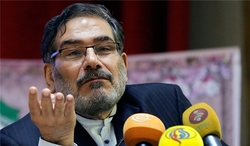 Secretary of Iran's Supreme National Security Council (SNSC) Ali Shamkhani categorically condemned the Monday multiple terrorist attacks in Afghanistan’s capital city of Kabul where scores of civilians were killed and injured.
Secretary of Iran's Supreme National Security Council (SNSC) Ali Shamkhani categorically condemned the Monday multiple terrorist attacks in Afghanistan’s capital city of Kabul where scores of civilians were killed and injured. RNA - Shamkhani, in a message to Afghanistan National Security Adviser Hamdollah Moheb, condemned the recent terrorist attacks in Kabul where defenseless people were targeted, and expressed condolences to the Afghan government and people.
Emphasizing the importance of cooperation and mutual understanding among all countries for fighting the sinister phenomenon of terrorism, he said terrorists and extremists have targeted the core of the human societies.
These painful measures taken by extremist and Takfiri groups will end just by serious determination and cooperation among the neighboring countries.
He also expressed Iran's readiness to help bring back stability and security to Afghanistan.
Scores of people were wounded with fatalities feared after a bomb-laden truck rocked Kabul, followed by gunmen battling special forces in an area housing military and government buildings.
The Taliban claimed responsibility for the rush-hour explosion early Monday, which sent a plume of smoke into the air above the Puli Mahmood Khan neighborhood of the Afghan capital.
Health ministry officials said at least 100 people were wounded, including 35 children, who were taken to hospital, but the casualties were likely to rise.
Taliban spokesman Zabiullah Mujahid said the insurgents had targeted a defense ministry building in the area.
A government security official said at least three gunmen entered the building after the explosives were detonated near the ministry's engineering and logistics department.
The explosion came as the US was about to begin a third day of negotiations with the Taliban in Doha.
In the previous round of US-Taliban peace talks earlier this year, the two sides “agreed in draft” on the withdrawal of foreign troops from Afghanistan in return for a Taliban guarantee that the group's elements would not attack US forces.
The US and its allies invaded Afghanistan under the pretext of the global war on terror. Some 18 years on, the Taliban have only boosted their presence across the country, and Washington is seeking truce with the militants.
President Donald Trump, while maintaining that he wants the US to “just get out” of the 18-year mire of a campaign in Afghanistan, has now stated that he won't do it after all – leaving behind a “very strong” intelligence presence.
In an interview with Fox News’ 'Tucker Carlson Tonight’ aired on Monday, Trump said that he still wanted to pull the US troops out of Afghanistan, in line with his previous pledge, but cannot since the country has turned into a breeding ground for terrorists in wake of the US intervention in 2001.
“Look, I would like to just get out. The problem is it just seems to be a lab for terrorists, I call it a Harvard of Terrorists,” Trump stated.
Pressed on whether he plans to “be getting out entirely”, Trump echoed the argument made by his Republican predecessor George W. Bush, who’d started what has become the longest war in the US history.
American has lost close to 2,500 people and nearly a trillion dollars to the conflict, without coming anywhere near to stamping out Taliban, which, according to a report by the Special Inspector General for Afghanistan Reconstruction (SIGAR) this year, controlled just under half the country's territory.
“You know, no matter how you feel, but if you are standing there near to some very talented military people saying: “I would rather attack them over there, than have them hit us over here and fight them on our land” – that’s something you have to think about,” Trump added.
For that purpose, Trump said the US would be leaving “very strong intelligence” in Afghanistan, noting, “Far more than you would normally think."
Back in 2007, Bush insisted that there was “one principle of which every member of every party should be able to agree on” and that is that the US “got to fight the terrorists overseas, so we don’t have to face them at home again".
While agreeing with Bush’s interventionist agenda, even though it appears to contradict his own ‘America First’ motto, Trump at the same time lamented the US' self-imposed role of the world policeman.
“We are the policeman for the whole world. If you look at Russia, Russia doesn’t police the word. They police Russia. You look at China, they don’t police, they do not have the troops everywhere,” he stated.
There have been hopes that the ongoing US-Taliban talks initiated by the Trump administration would pave the way for a peace deal between the militants and Kabul and eventually result in the withdrawal of the US troops. The latest, seventh, round of talks, kicked off on Saturday in Qatar, but so far the negotiations did little to placate the deadly violence that claimed three US soldiers past week, bringing the US death toll in the country to ten this year.
Despite the slow pace of negotiations and a spike in violence on the ground, US Secretary of State Mike Pompeo announced last week that he looks forward to brokering a peace deal in Afghanistan “before September 1”.
847/940